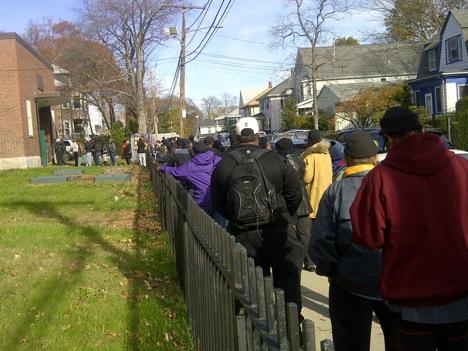October 29, 2012

Voters lined up outside the Chittick School on Ruskindale Rd. (Hyde Park-Mattapan line) today.
The city’s elections chief is warning voters to read up on today's ballot, saying its length could lead to longer wait times at the polls. The ballot spans two pages and is 18 inches long due to several complex ballot questions dealing with auto repair, assisted suicide and medical marijuana. Some ballots will have a fourth question, a non-binding resolution on federal budget cuts.
“You need to do your homework before,” said Election Commissioner Geraldine Cuddyer.
By law, voters have five minutes to mark up the ballot. Cuddyer suggested that people read the ballot questions ahead of time. Voters are also allowed to bring a “cheat sheet,” or a notepad, for guidance. “If people are waiting to read those ballot questions, they may as well bring a sandwich,” Cuddyer said.
Buckle in for Question 1: Despite the Legislature passing a compromise law that seemed to satisfy camps on both sides, the Right to Repair campaign has forged ahead in a campaign for a “yes” vote, to the chagrin of those who worked on the compromise.
Question 1 aims to require car manufacturers to allow owners and independent repair facilities to have access to the same car diagnostic and repair information that deals and other repair facilities are able to access, according to Secretary of State William Galvin’s office, which is in charge of elections. Supporters say the ballot question would allow for easier repairs to cars, while opponents say vehicle manufacturers already have the ability to buy repair information due to a 2002 nationwide agreement.
Question 2 would allow a licensed physician to prescribe life-ending medication to a terminally-ill patient at their request. Supporters say it’s “death with dignity,” opponents are saying the question is poorly written and “enabling suicide.”
The last statewide ballot initiative, Question 3, would allow certain patients to obtain marijuana for medical purposes through a network of state-regulated centers. They would also be allowed, in “specific hardship cases,” to grow their own, according to Galvin’s office. Proponents say the question will help ease the suffering of patients dealing with cancer, multiple sclerosis, HIV/AIDS and Parkinson’s. But opponents say the proposed law has loopholes and would lead to 35 “pot shops” across the state, and possibly next to schools.
Some areas will have a fourth ballot question on the federal budget. The non-binding question calls for state lawmakers to vote for a referendum demanding that Washington, D.C. avoid cuts to Social Security and other programs, while closing corporate tax loopholes and ending the war in Afghanistan.
The November 2012 ballot also includes, of course, the presidential and Senate races. “Both of those are contributing to a healthy turnout in the city of Boston,” Cuddyer said.
In 2008, when President Obama faced off against Arizona Sen. John McCain, voter turnout hit 62 percent. Four years later, Obama is up against former Mass. Gov. Mitt Romney.
U.S. Sen. Scott Brown (R-Wrentham), up for reelection after winning a special election in January 2010, will be up against Democratic candidate Elizabeth Warren (D-Cambridge).
The elections department had processed 14,000 absentee ballots, as of Friday. The number includes voters overseas and residents who are going to be out of town on Election Day.
The rest of the ballot will likely be light for Boston voters, with the all-Democratic State House and Congressional delegations facing little to no opposition.
Read the ballot questions here.
Topics:


